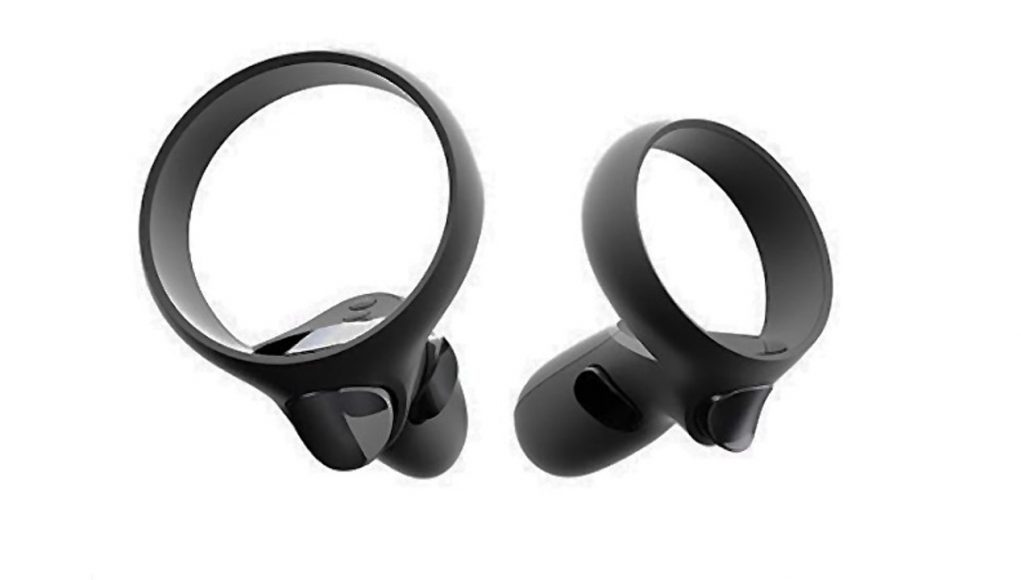The opening keynote at the fourth annual Oculus Connect developer conference delivered several new product announcements from Facebook CEO Mark Zuckerberg, VP of Virtual Reality Hugo Barra, and others. This included new standalone VR hardware, a new price for the Rift, and many software and game reveals.
Affordable standalone headset ‘Oculus Go’ revealed:
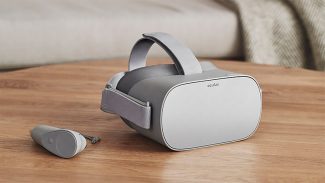
At $199, Oculus Go is a low-cost, all-in-one standalone headset launching in early 2018. On stage, Hugo Barra claimed that the headset was designed to deliver the “best visual clarity of any product we’ve ever built”, using a “fast-switch LCD” at 2560×1440 and an “all-new, custom optical design”. The lenses are an evolution of the ‘hybrid’ optics found in the current Rift. Sharing the same controller input set as Gear VR – a single controller and rotational-only tracking – apps will be “binary compatible”, working on both systems. Essentially, Oculus Go is an enhanced, standalone version of Gear VR.
Project Santa Cruz developer kits coming in 2018, we go hands-on:
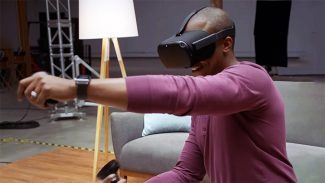
Described as the “first, complete, standalone VR system with full inside-out tracking and hand presence”, Santa Cruz developer kits will be available next year. The company revealed various improvements to the latest prototype, including brand new 6-degrees-of-freedom controllers, similar to Touch. Unlike Oculus Go, Santa Cruz is designed as a high-end, standalone system, with full positional tracking on both headset and controllers, but will be limited by the performance of its on-board mobile PC. Check out our hands-on impressions here.
‘Oculus Dash’ is a total interface overhaul, supports desktop apps:
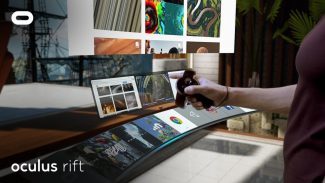 Nate Mitchell, Head of Rift, described how Oculus has been rebuilding the core software from the ground up over the past year, introducing various improvements to ‘Rift Core 2.0’. Most significantly, Oculus Dash is a total overhaul of the Rift user interface, designed specifically for motion input. It combines the existing functionality of Home and the Universal Menu, while allowing access to traditional desktop apps. Mitchell claims Dash will offer “best in class performance and visual quality,” for PC apps in VR, setting the platform “on a path to replacing real monitors entirely.”
Nate Mitchell, Head of Rift, described how Oculus has been rebuilding the core software from the ground up over the past year, introducing various improvements to ‘Rift Core 2.0’. Most significantly, Oculus Dash is a total overhaul of the Rift user interface, designed specifically for motion input. It combines the existing functionality of Home and the Universal Menu, while allowing access to traditional desktop apps. Mitchell claims Dash will offer “best in class performance and visual quality,” for PC apps in VR, setting the platform “on a path to replacing real monitors entirely.”
Oculus Home also completely rebuilt:
 The Rift Core 2.0 update also brings a brand new Oculus Home space, with a more realistic visual design, with “state of the art lighting” and “dynamic soft shadows”, powered by Unreal Engine 4. This is customisable with toys, furniture, artwork and achievements, and is designed to be a persistent, social space, with the potential to create shared spaces in the future.
The Rift Core 2.0 update also brings a brand new Oculus Home space, with a more realistic visual design, with “state of the art lighting” and “dynamic soft shadows”, powered by Unreal Engine 4. This is customisable with toys, furniture, artwork and achievements, and is designed to be a persistent, social space, with the potential to create shared spaces in the future.
Rift receives permanent price cut:
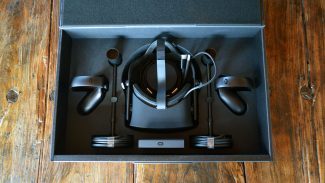
Hugo Barra, Vice President of Virtual Reality at Oculus announced a permanent price cut of the Rift and Touch bundle to $399. The package still includes the same hardware bundle of headset, two sensors, two Touch controllers, and “six free apps” – although there are actually several more free apps available on the Store.
Echo Arena FPS Expansion, more Lone Echo coming:

Following the success of Ready at Dawn’s sci-fi adventure Lone Echo (2017) and standalone multiplayer mode Echo Arena, the studio has confirmed a new multiplayer, first-person shooter experience coming in 2018 called Echo Combat. In addition, more single player content for Lone Echo is on the way, continuing the adventure of Captain Olivia and Jack.
Respawn Entertainment developing Rift-exclusive VR title:
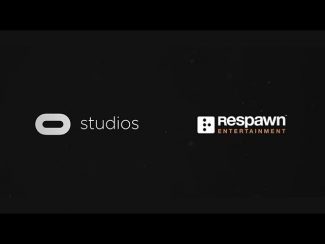 Oculus’ Head of Content Jason Rubin’s closing announcement was that Respawn Entertainment, ex-Call of Duty developers and creators of Titanfall, are building a major new VR title for Oculus Rift. The game is due to launch in 2019, and Respawn director Peter Hirschmann offered a few details on their blog.
Oculus’ Head of Content Jason Rubin’s closing announcement was that Respawn Entertainment, ex-Call of Duty developers and creators of Titanfall, are building a major new VR title for Oculus Rift. The game is due to launch in 2019, and Respawn director Peter Hirschmann offered a few details on their blog.

